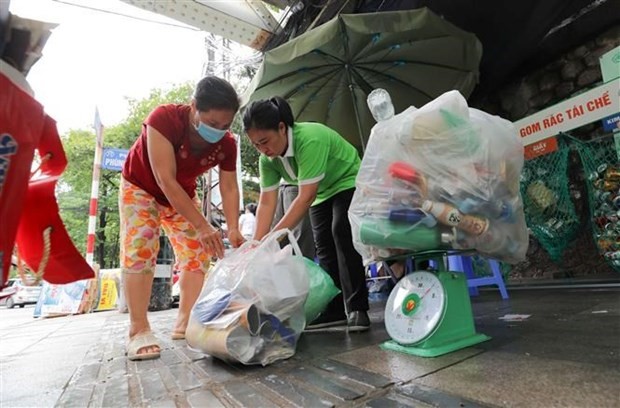Classification, storage and transfer of domestic solid waste in Vietnam
Below are the latest guidelines on the classification, storage and transfer of domestic solid waste in Vietnam.

Classification, storage and transfer of domestic solid waste in Vietnam (Image from Internet)
1. Classification, storage and transfer of domestic solid waste in Vietnam
Classification, storage and transfer of domestic solid waste according to Article 75 of the Environmental Protection Law 2020 as follows:
* Household solid waste generated from households and individuals is classified according to the following principles:
- Solid waste with potential for reuse and recycling;
- Food waste;
- Other household solid waste.
* The Provincial People's Committee determines the specific classification of household solid waste prescribed in point c, clause 1, Article 75 of the Environmental Protection Law 2020 in their locality following the guidance of the Ministry of Natural Resources and Environment; there are policies to encourage the separate classification of hazardous waste in household solid waste generated from households and individuals.
* Households and individuals in urban areas must contain and hold household solid waste, after classification according to clause 1, Article 75 of the Environmental Protection Law 2020, in bags for transfer as follows:
- Solid waste with potential for reuse and recycling is transferred to organizations or individuals for reuse and recycling or facilities with the function of collecting and transporting household solid waste;
- Food waste and other household solid waste must be contained in bags according to regulations and transferred to facilities with the function of collecting and transporting household solid waste; food waste can be used as organic fertilizer or animal feed.
*Households and individuals in rural areas generating household solid waste after classification according to clause 1, Article 75 of the Environmental Protection Law 2020 should manage it as follows:
- Encourage maximum utilization of food waste for organic fertilizer or animal feed;
- Solid waste with potential for reuse and recycling is transferred to organizations or individuals for reuse and recycling or facilities with the function of collecting and transporting household solid waste;
- Food waste not utilized according to point a, clause 4, Article 75 of the Environmental Protection Law 2020 must be transferred to facilities with the function of collecting and transporting household solid waste;
- Other household solid waste must be contained in bags according to regulations and transferred to facilities with the function of collecting and transporting household solid waste.
* Encourage households and individuals in rural areas generating household solid waste to classify, store, and transfer household solid waste according to clause 3, Article 75 of the Environmental Protection Law 2020.
* The classification, collection, transportation, and treatment of bulky waste are carried out according to the regulations of the Provincial People's Committee.
* The Vietnam Fatherland Front Committee and socio-political organizations at all levels mobilize the community, households, and individuals to classify household solid waste at the source. Communities and socio-political organizations at the grassroots level are responsible for monitoring the classification of household solid waste by households and individuals.
2. Classification, storage and transport of normal industrial solid waste in Vietnam
Classification, storage and transport of normal industrial solid waste in Vietnam according to Article 81 of the Environmental Protection Law 2020 as follows:
* Ordinary industrial solid waste is classified into the following groups:
- Group of ordinary industrial solid waste that can be reused and recycled as production materials
- Group of ordinary industrial solid waste that meets standards, technical regulations, and technical guidelines for use in construction material production and landfilling;
- Group of ordinary industrial solid waste that must be treated.
* Owners of production, business, and service establishments; concentrated production, business, and service zones; industrial clusters; agencies; and organizations generating ordinary industrial solid waste are responsible for on-site classification according to clause 1, Article 81 of the Environmental Protection Law 2020; and storing to ensure no environmental pollution. Ordinary industrial solid waste not classified must be managed as waste prescribed in point c, clause 1, Article 81 of the Environmental Protection Law 2020.
* Ordinary industrial solid waste mixed with hazardous waste that is not or cannot be classified must be managed according to hazardous waste management regulations.
* Ordinary industrial solid waste must be stored separately according to classified types; hazardous waste must not be mixed with ordinary industrial solid waste; no spreading of dust or leakage of water into the environment; storage must involve suitable equipment, tools, and storage areas as regulated by the Minister of Natural Resources and Environment.
* The transportation of ordinary industrial solid waste must meet the following requirements:
- Waste must be contained in equipment and tools to ensure no spillage, leakage, or spread into the environment during transportation, except for specific waste with a large volume directly contained in the transporting means or containers;
- Waste must be transported by type after classification according to regulations;
- Transport means for ordinary industrial solid waste requiring treatment must have positioning equipment meeting technical requirements, operate on a designated route and time as prescribed by the Provincial People's Committee.
- Key word:
- domestic solid waste
- Vietnam
- Cases of land rent exemption and reduction under the latest regulations in Vietnam
- Economic infrastructure and social infrastructure system in Thu Duc City, Ho Chi Minh City
- Regulations on ordination with foreign elements in religious organizations in Vietnam
- Increase land compensation prices in Vietnam from January 1, 2026
- Determination of land compensation levels for damage during land requisition process in Vietnam
- Who is permitted to purchase social housing according to latest regulations in Vietnam?
-

- Number of deputy directors of departments in Vietnam ...
- 15:04, 05/03/2025
-

- Cases ineligible for pardon in Vietnam in 2025
- 14:43, 05/03/2025
-

- Decree 50/2025 amending Decree 151/2017 on the ...
- 12:00, 05/03/2025
-

- Circular 07/2025 amending Circular 02/2022 on ...
- 11:30, 05/03/2025
-

- Adjustment to the organizational structure of ...
- 10:34, 05/03/2025
-

- Notable new policies of Vietnam effective as of ...
- 16:26, 11/04/2025
-
.Medium.png)
- Notable documents of Vietnam in the previous week ...
- 16:21, 11/04/2025
-
.Medium.png)
- Notable documents of Vietnam in the previous week ...
- 16:11, 02/04/2025
-
.Medium.png)
- Notable new policies of Vietnam to be effective ...
- 16:04, 02/04/2025
-
.Medium.png)
- Notable new policies of Vietnam effective from ...
- 14:51, 21/03/2025

 Article table of contents
Article table of contents
